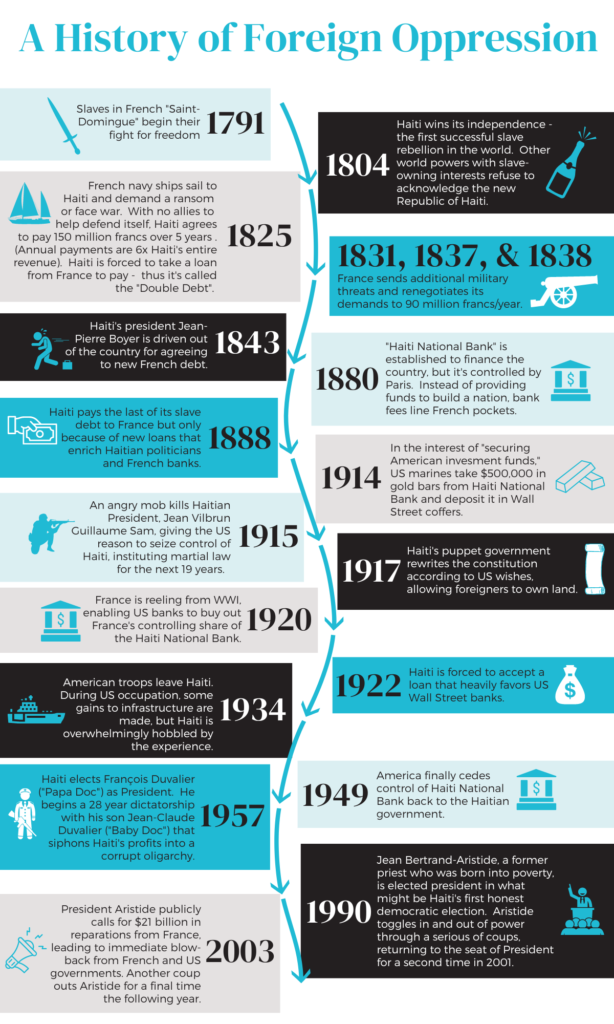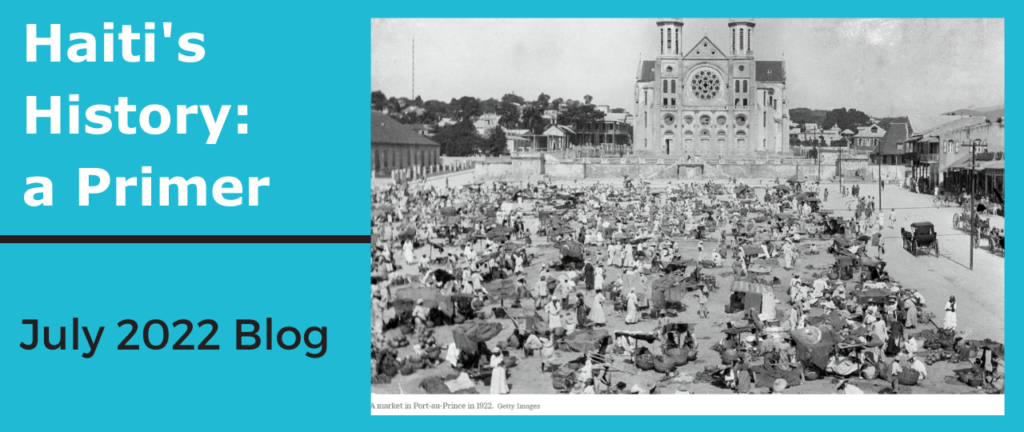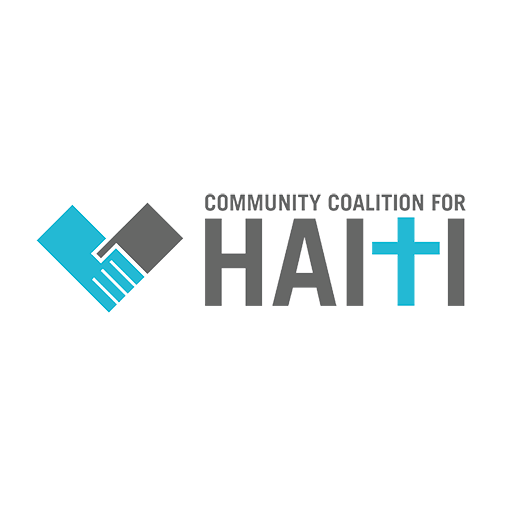Sometimes to understand where we are, we need to look back at how we got there. It’s easy to see Haiti today and blame the country’s problems on corrupt leadership, natural disasters, or a fatalistic “that’s the way it’s always been” outlook. But in reality, many of Haiti’s struggles are rooted in rapacious attacks from powerful countries – most notably France and the United States. At CCH we take a holistic approach to transforming lives. That means considering all angles of a problem before we try to solve it. In this month’s blog we thought we’d take a look at Haiti’s history to get a big picture view of where we operate.
The timeline below is a brief overview of Haiti’s economic and political history. It’s followed by a summary of historical highlights and list of links you can click on to learn more. Much of the information here comes from a series of deep dive New York Times articles that were published earlier this year.

Saint Domingue was the western portion of Hispaniola colonized by the French in the 1600-1700’s. Land owners imported tens of thousands of African slaves each year to work under brutal conditions on lucrative coffee and sugar plantations. In 1791, slaves began a rebellion to overthrow their French oppressors, and in 1804 they succeeded in establishing a new country: the Republic of Haiti.
As one might imagine, other countries were threatened by this successful slave revolution; they retaliated by refusing to trade with or provide aid to Haiti. Nineteen years later, France returned to Haiti with warships and an ultimatum: pay an exorbitant ransom for their freedom or face war. This was an absurd “reparations” to France for the property – land and slaves – that France was deprived of when Haiti gained independence. Having no alternatives, Haiti agreed to pay. Of course, the amount (150 million francs over 5 years) was impossible – one year of payment was six times Haiti’s entire government revenue. (In comparison, the United States’ Louisiana purchase in that same time frame was $80 million francs for 77 times the amount of land.) France offered Haiti a loan to pay the ransom.
Thus Haiti began its crippling debt to France – dubbed the “Double Debt,” first from the ransom amount and then from the loan interest. Haiti is the only country that has ever been required to pay for their freedom having already won it. While Haiti couldn’t pay the full amount required, they ended up paying a total of $560 million (in today’s US currency) to France over a period of 64 years. Some years Haiti’s payments to France were 40% of the total government revenue. Imagine what that money could have done to build Haiti’s infrastructure instead.
In the early 1900’s when it seemed as though Haiti might get out from under French thumbs, the United States moved in (literally) to protect America from foreign threats and take their cut of the country’s riches. The American military occupied Haiti from 1915 to 1934, and controlled the Haiti National Bank until 1949. During this time Haitians built valuable infrastructure for the country, but under forced labor conditions that embittered the people.
The later 20th century and 2000’s have seen further decline Haitians’ quality of life due to political corruption, natural disasters, and the crushing legacy of Haiti’s foreign debt. Experts estimate that Haiti’s payments to France have led to an economic deficit of $21 to 115 billion dollars today. In other words, Haiti’s infrastructure and economy would be on par with its island neighbor, the Dominican Republic, were it not for that double debt.
The world has long turned its back on – or actively exploited – Haiti. It is not just “bad luck” that the country is facing so many problems today. But we can change that – piti a piti (little by little). We can give generously to organizations like CCH and we can make our voices heard. In the words of former US Special Envoy to Haiti, Daniel Foote, “What our Haitian friends really want, and need, is the opportunity to chart their own course, without international puppeteering and favored candidates but with genuine support for that course.”
If you are interested in helping advocate for more Haitian autonomy in international relations, please check out the “US Hands Off Haiti’s Democracy” campaign that’s happening now. Our partners at the Haiti Response Coalition are working to advance this Haitian-led initiative.
At CCH, we’re dedicated to empowering Haitians to transform lives one by one. Thanks for being part of our Coalition!
Additional Resources
- A quick overview with pictures showing where Haiti’s money went: https://www.nytimes.com/interactive/2022/05/20/world/americas/enslaved-haiti-debt-timeline.html
- 6 Take-aways about Haiti’s “reparation” (ransom) payments to France: https://www.nytimes.com/2022/05/20/world/americas/takeaways-haiti-reparations-france.html
- A detailed deep dive into the paper trail of Haiti’s reparations: https://www.nytimes.com/2022/05/20/world/americas/haiti-history-colonized-france.html
- A nice overview of how Haiti’s economy has ended up where it is today: https://www.nytimes.com/2022/05/22/briefing/haiti-france-slavery-investigation.html
- “How a French Bank Captured Haiti”: https://www.nytimes.com/2022/05/20/world/french-banks-haiti-cic.html
- The historical accuracy and political fall out of Aristide’s demand for France’s reparations to Haiti: https://www.nytimes.com/2022/05/20/world/americas/haiti-aristide-reparations-france.html
- The bibliography of sources used for these New York Times investigative pieces: https://www.nytimes.com/2022/05/20/world/americas/haiti-bibliography.html
- 30-minute podcast summarizing the NYT articles: https://open.spotify.com/episode/4EJ3brpOG9V1vanfswwSWf
- 30-minute podcast tracing the 2021 presidential assassination back through Haiti’s history: https://open.spotify.com/episode/4LofzwziioazwjI86siJWM?si=uqcZq2PeRHmxVZZEMXoUYQ&nd=1




